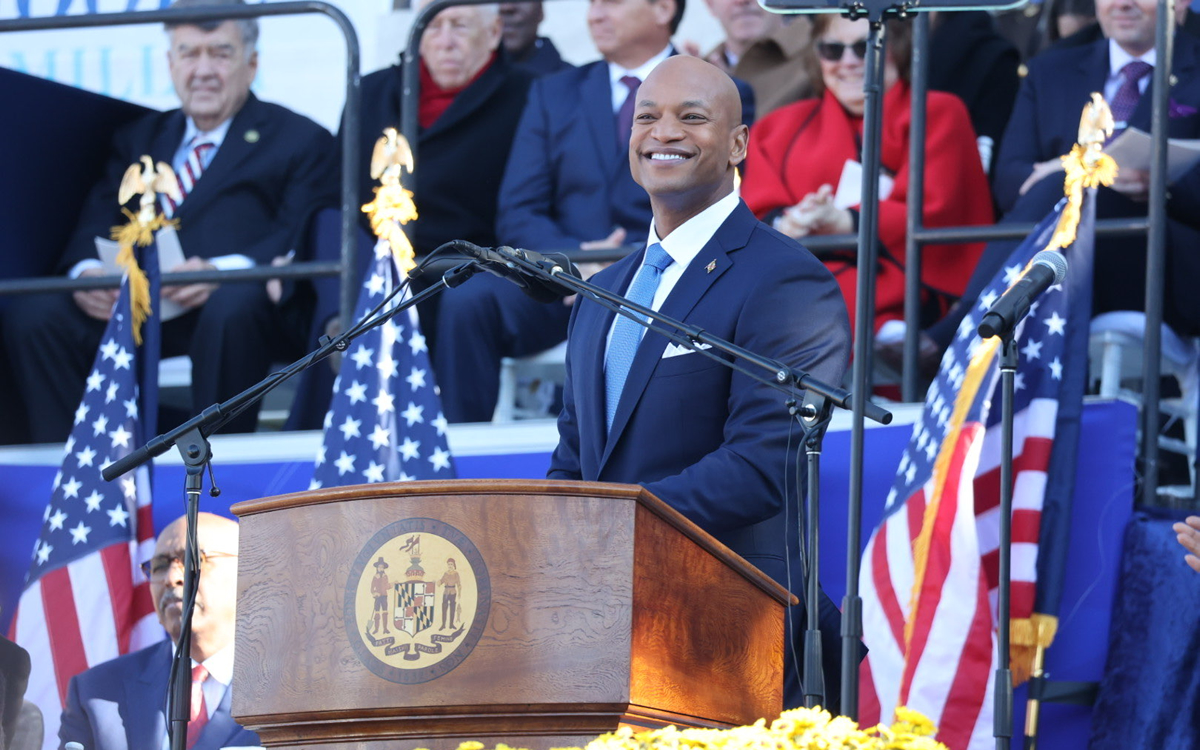News
Russian LGBT rights advocates visit D.C., Maine
Urge end to country’s anti-gay crackdown


Oleg Klyuenkov and Lyudmila Romodina of the Russian LGBT advocacy group Rakurs in D.C. on Nov. 8, 2013. (Washington Blade photo by Michael K. Lavers)
Two Russian LGBT rights advocates last week urged U.S. officials to continue to pressure the Kremlin to end its anti-gay crackdown.
Lyudmila Romodina and Oleg Klyuenkov of Rakurs (“Perspective” in Russian) in the city of Arkhangelsk met with U.S. Sen. Patty Murray (D-Wash.) and officials with the U.S. State Department, the White House and the Helsinki Commission in D.C. on Nov. 7. They also discussed Russia’s gay rights record Congressional LGBT Equality Caucus staffers on Capitol Hill on Nov. 8.
Romodina and Klyuenkov arrived in the U.S. on Nov. 1 — the same day the Olympic torch passed through Arkhangelsk on its way to the 2014 Winter Olympics that will take place in Sochi, Russia, in February.
Their trip began in Portland, Maine, where they met with the city’s mayor, Michael Brennan, members of a local PFLAG chapter, Equality Maine and other LGBT rights advocates and officials. The activists’ visit coincided with the 25th anniversary of the sister city partnership between Portland and Arkhangelsk.
Romodina and Klyuenkov returned to Russia on Nov. 10.
Human Rights First, a group that promotes international human rights, organized Romodina and Klyuenkov’s trip to the U.S.
“We’re trying to use [Russian] American partnerships in a constructive way; to take the partnership to a new level of dialogue where human rights and LGBT rights are present at the table, they’re discussed,” Innokenty Grekov of Human Rights First told the Washington Blade during an interview in Northwest Washington on Nov. 8.
Arkhangelsk law was ‘test pilot’ for national gay propaganda ban
Rakurs, which is a member of the Russian LGBT Network, is the first group that specifically works with Arkhangelsk’s LGBT residents.
The group was a feminist organization when it was founded in 2007. Russia’s Justice Ministry in 2010 denied Rakurs’ request to add the words lesbian, gay, bisexual and transgender to their charter and by-laws.
A regional court later ordered the Justice Ministry to allow Rakurs to register as an LGBT rights organization.
“It took some time,” Klyuenkov told the Blade through an interpreter.
Arkhangelsk officials in 2011 banned propaganda that promotes homosexuality and bisexuality. They quietly repealed the law last month, but Klyuenkov told the Blade the Arkhangelsk statute was a “test pilot” for the nationwide ban on gay propaganda to minors that Russian President Vladimir Putin signed in June.
“The informational campaign that surrounded the regional ban in Arkhangelsk was a miniature version of the mass media campaign that surrounded the adoption of the federal ban,” Klyuenkov said. “It was quite aggressive as we were just slandered and slimed. We were accused of undermining demography of Russia, undermining traditional values, being a threat to traditional values.”
Rakurs distributed leaflets that contained information on what Klyuenkov described as the “dangers of adopting a federal law on propaganda.” The organization also sought a permit to stage a protest against the measure as members of the Russian Duma debated it, but Romodina told the Blade that Arkhangelsk officials used the regional gay propaganda ban to deny their request.
“When we received these denials for demonstrations involving multiple individuals, we went and nevertheless demonstrated in single pickets,” she said.
Lawmakers criticize IOC during advocates’ trip
Romodina and Klyuenkov’s trip to the U.S. coincided with the growing outrage over the Kremlin’s LGBT rights record that threatens to overshadow the Sochi games.
U.S. Sens. Barbara Boxer (D-Calif.), Christopher Murphy (D-Conn.), Jeff Merkley (D-Ore.), Dick Durbin (D-Ill.), Jeanne Shaheen (D-N.H.), Sheldon Whitehouse (D-R.I.), Claire McCaskill (D-Mo.), Al Franken (D-Minn.), Elizabeth Warren (D-Mass.), Christopher Coons (D-Del.) and Mark Udall (D-Colo.) in a Nov. 8 letter criticized International Olympic Committee President Thomas Bach over his previous comments that appeared to suggest he feels Russia’s gay propaganda ban does not violate the Olympic Charter.
Bach said in September before the lighting of the Olympic torch in Greece that Olympic values include “respect without any form of discrimination.” Putin on Oct. 28 reiterated previous Russian government claims that gays and lesbians will not suffer discrimination during the Sochi games.
“Although some Russian authorities have indicated that the law will not affect Olympic spectators and participants, we have yet to see a satisfactory explanation of what type of activities or behavior will be permitted,” the U.S. senators wrote in their letter. “If LGBT individuals or supporters were to be arrested or harassed during the Olympics, the reputation of the IOC would be damaged.”
U.S. Rep. Ileana Ros-Lehtinen (R-Fla.) and more than three dozen other members of Congress last month urged U.S. Olympic Committee President Scott Blackmun to outline steps the USOC plans to take to safeguard American athletes who plan to compete in Sochi.
Blackmun on Oct. 11 described Russia’s gay propaganda ban is “inconsistent with the fundamental principles of the Olympic and Paraolympic movements.” The U.S. Olympic Committee Board of Directors the day before voted to add sexual orientation to its non-discrimination policy.
Advocates oppose Olympic boycott
Romodina and Klyuenkov are the latest Russian LGBT rights advocates to visit the U.S.
Igor Kochetkov of the Russian LGBT rights group Sphere is among those who met with Ros-Lehtinen on Capitol Hill in September. He was part of the group of human rights activists who met with President Obama during the G-20 summit in St. Petersburg a few weeks earlier.
Russian LGBT Sports Federation Co-President Elvina Yuvakaeva was part of a five-member delegation whom the State Department invited to the U.S. in September to meet with professional American sports team and organizers of the 1996 Summer Olympics in Atlanta and the 2002 Winter Olympics in Salt Lake City.
Klyuenkov told the Blade he feels “interest groups” within the Russian government have “persuaded” Putin to sign the gay propaganda law and other anti-LGBT measures. These include a 2012 statute that requires groups that receive funding from outside the country to register as “foreign agents.”
“This federal law on propaganda is part of a larger, broader policy,” Klyuenkov said. “The government is simply trying to distract the public’s attention from our societal problems, our economic problems.”
Klyuenkov and Rodomina both stressed their organization remains opposed to any boycott of the Sochi games over Russia’s LGBT rights record.
“We should use both the Olympic games and the existing relationships between our municipal entities as a platform for discussing human rights, for encouraging more dialogue within Russia between the government and civil society and LGBT groups,” Klyuenkov said.
The advocates spoke with the Blade a day before gay MSNBC anchor Thomas Roberts co-hosted the Miss Universe pageant in Moscow.
Roberts repeatedly criticized the gay propaganda law during interviews with the “Today” show and other media outlets in the days leading up to the pageant that Donald Trump co-owns with NBC Universal. Pageant participants did not discuss Russia’s LGBT rights record during the event.
“It’s great,” Klyuenkov told the Blade when asked about Roberts co-hosting the pageant. “I don’t think the Russian people watch Miss Universe.”
Elton John is scheduled to perform two concerts in Russia next month amid controversy from some LGBT rights advocates.
“His approach is to go over and engage and win over,” Grekov told the Blade. “Rakurs is doing the same. Human Rights First is so happy to help facilitate this visit and raise their voice.”

Maryland Gov. Wes Moore on Thursday signed a bill that seeks to combat efforts to ban books from state libraries.
House Bill 785, also known as the Freedom to Read Act, would establish a state policy “that local school systems operate their school library media programs consistent with certain standards; requiring each local school system to develop a policy and procedures to review objections to materials in a school library media program; prohibiting a county board of education from dismissing, demoting, suspending, disciplining, reassigning, transferring, or otherwise retaliating against certain school library media program personnel for performing their job duties consistent with certain standards.”
Moore on Thursday also signed House Bill 1386, which GLSEN notes will “develop guidelines for an anti-bias training program for school employees.”

The Mexican Senate on Thursday approved a bill that would ban so-called conversion therapy in the country.
Yaaj México, a Mexican LGBTQ rights group, on X noted the measure passed by a 77-4 vote margin with 15 abstentions. The Chamber of Deputies, the lower house of Mexico’s congress, approved the bill last month that, among other things, would subject conversion therapy practitioners to between two and six years in prison and fines.
The Senate on its X account described conversion therapy as “practices that have incentivized the violation of human rights of the LGBTTTIQ+ community.”
“The Senate moved (to) sanction therapies that impede or annul a person’s orientation or gender identity,” it said. “There are aggravating factors when the practices are done to minors, older adults and people with disabilities.”
Mexico City and the states of Oaxaca, Quintana Roo, Jalisco and Sonora are among the Mexican jurisdictions that have banned the discredited practice.
The Senate in 2022 passed a conversion therapy ban bill, but the House of Deputies did not approve it. It is not immediately clear whether President Andrés Manuel López Obrador supports the ban.
Canada, Brazil, Belgium, Germany, France, and New Zealand are among the countries that ban conversion therapy. Virginia, California, and D.C. are among the U.S. jurisdictions that prohibit the practice for minors.
The White House
Four states to ignore new Title IX rules protecting transgender students
Biden administration last Friday released final regulations

BY ERIN REED | Last Friday, the Biden administration released its final Title IX rules, which include protections for LGBTQ students by clarifying that Title IX forbids discrimination based on sexual orientation and gender identity.
The rule change could have a significant impact as it would supersede bathroom bans and other discriminatory policies that have become increasingly common in Republican states within the U.S.
As of Thursday morning, however, officials in at least four states — Oklahoma, Louisiana, Florida, and South Carolina — have directed schools to ignore the regulations, potentially setting up a federal showdown that may ultimately end up in a protracted court battle in the lead-up to the 2024 elections.
Louisiana State Superintendent of Education Cade Brumley was the first to respond, decrying the fact that the new Title IX regulations could block teachers and other students from exercising what has been dubbed by some a “right to bully” transgender students by using their old names and pronouns intentionally.
Asserting that Title IX law does not protect trans and queer students, Brumley states that schools “should not alter policies or procedures at this time.” Critically, several courts have ruled that trans and queer students are protected by Title IX, including the 4th U.S. Circuit Court of Appeals in a recent case in West Virginia.
In South Carolina, Schools Supt. Ellen Weaver wrote in a letter that providing protections for trans and LGBTQ students under Title IX “would rescind 50 years of progress and equality of opportunity by putting girls and women at a disadvantage in the educational arena,” apparently leaving trans kids out of her definition of those who deserve progress and equality of opportunity.
She then directed schools to ignore the new directive while waiting for court challenges. While South Carolina does not have a bathroom ban or statewide “Don’t Say Gay or Trans” law, such bills continue to be proposed in the state.
Responding to the South Carolina letter, Chase Glenn of Alliance For Full Acceptance stated, “While Supt. Weaver may not personally support the rights of LGBTQ+ students, she has the responsibility as the top school leader in our state to ensure that all students have equal rights and protections, and a safe place to learn and be themselves. The flagrant disregard shown for the Title IX rule tells me that our superintendent unfortunately does not have the best interests of all students in mind.”
Florida Education Commissioner Manny Diaz also joined in instructing schools not to implement Title IX regulations. In a letter issued to area schools, Diaz stated that the new Title IX regulations were tantamount to “gaslighting the country into believing that biological sex no longer has any meaning.”
Governor Ron DeSantis approved of the letter and stated that Florida “will not comply.” Florida has notably been the site of some of the most viciously anti-queer and anti-trans legislation in recent history, including a “Don’t Say Gay or Trans” law that was used to force a trans female teacher to go by “Mr.”
State Education Supt. Ryan Walters of Oklahoma was the latest to echo similar sentiments. Walters has recently appointed the right-wing media figure Chaya Raichik of Libs of TikTok to an advisory role “to improve school safety,” and notably, Raichik has posed proudly with papers accusing her of instigating bomb threats with her incendiary posts about LGBTQ people in classrooms.
The Title IX policies have been universally applauded by large LGBTQ rights organizations in the U.S. Lambda Legal, a key figure in fighting anti-LGBTQ legislation nationwide, said that the regulations “clearly cover LGBTQ+ students, as well as survivors and pregnant and parenting students across race and gender identity.” The Human Rights Campaign also praised the rule, stating, “rule will be life-changing for so many LGBTQ+ youth and help ensure LGBTQ+ students can receive the same educational experience as their peers: Going to dances, safely using the restroom, and writing stories that tell the truth about their own lives.”
The rule is slated to go into effect Aug. 1, pending any legal challenges.
****************************************************************************

Erin Reed is a transgender woman (she/her pronouns) and researcher who tracks anti-LGBTQ+ legislation around the world and helps people become better advocates for their queer family, friends, colleagues, and community. Reed also is a social media consultant and public speaker.
******************************************************************************************
The preceding article was first published at Erin In The Morning and is republished with permission.
-

 District of Columbia3 days ago
District of Columbia3 days agoCatching up with the asexuals and aromantics of D.C.
-

 State Department5 days ago
State Department5 days agoState Department releases annual human rights report
-

 South America3 days ago
South America3 days agoArgentina government dismisses transgender public sector employees
-

 Maine4 days ago
Maine4 days agoMaine governor signs transgender, abortion sanctuary bill into law








